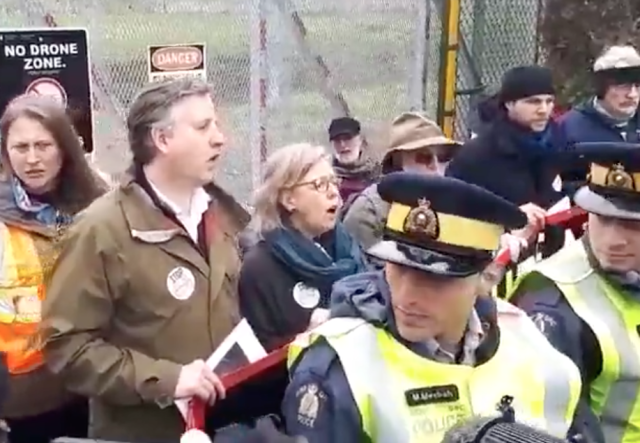Opinion: Is it ever right for political leaders to defy court orders?
Former Supreme Court of Canada Justice Ian Binnie said, “I think the recent popularity amongst political leaders denouncing judicial outcomes is extremely dangerous.” He was referring to the fact that Green Party Member of Parliament (and party leader) Elizabeth May and NDP Member of Parliament Kennedy Stewart defied a court order seeking to limit the actions of protestors of the Kinder Morgan pipeline expansion. Along with many other protestors, they were charged with criminal contempt of court and fined. Binnie also referred to a few instances of politicians commenting unfavourably on court decisions.
Binnie was speaking at a Law Society of BC lecture, the “Rule of Law” lecture, focused on social justice. He was responding to a question about tools for effecting change.
“Social protest certainly has a role,’” Binnie acknowledged. “Nevertheless, it strikes me that political leaders and the judges have to uphold the law as it is.” Later in discussion, he opined that certain categories of unjust laws are not true rule of law.
I do agree that judges must be bound by the law in their actions and their judgments – unless they can find the law in question unconstitutional. But I don’t agree that political leaders should be bound to uphold laws or court orders that they have reason to consider corrupt, unjust or dangerous — laws that are not “true rule of law.”
Political leaders need to question unjust laws and challenge them, and in rare cases of urgency, refuse to obey them. I am not commenting here about the justice or injustice or the wisdom or economic or climatic hazards of the Kinder Morgan pipeline, but I will point to former laws in Canada such as the 1884 amendment to the Indian Act that forced indigenous children to attend schools designed to alienate them from their families, language and culture. Such schools were already in use, but this amendment made it the law. The last residential school didn’t close until 1996.
The law in Canadian provinces did not allow women to vote – in Manitoba, until 1916; in Quebec, until 1940. Federally, women in Canada were not even considered “persons” until 1929, when the Privy Council of England – at that time the highest court of appeal available to Canadians – overturned a decision of the Supreme Court of Canada which had ruled, in 1928, that women were not “persons” and were therefore not eligible for appointment to the Senate.
Some bizarre and unjust immigration laws have stripped people of their Canadian citizenship for very odd reasons: a number of cases are cited in “The Lost Canadians,” a book by Don Chapman. Chapman himself was a victim of the strange laws around citizenship, and had to fight to have his reinstated after being stripped of it as a child, despite being born in Canada.
One of the cases in Chapman’s book is that of a young man who was born in Mexico in 1980, brought to Canada by his parents and granted citizenship later the same year. In 2002, he was notified that he had to reaffirm, or renew, his citizenship, so he applied to do that. Then he suddenly received a notice that he was not a citizen and never had been a citizen and was not eligible for citizenship because – get this, dear readers – his grandfather had been born out of wedlock. Or, at least, he was unable to prove otherwise. How ridiculously unjust was that?
In Ontario the legal status of Illegitimacy was abolished in 1978; in Quebec, it was abolished in 1983; in Saskatchewan, in 1990. Of all the Canadian provinces, only Nova Scotia still retained some legal distinctions between children born in wedlock and those born out of wedlock as of 2015. Why was the federal government rejecting a citizen because his grandfather may have been “illegitimate” when that status was arguably unconstitutional and had already been abolished in most of Canada’s provinces?
This is not even a handful of examples of the sorts of laws that I want politicians to rise up against – preferably by way of legislative change, but in cases where that process would take too long to effect justice in a given case, then by protesting in the streets and, if necessary, disobeying court orders limiting the area in which they could protest. Such orders are generally designed to make sure that the protest is rendered ineffective by preventing it from inconveniencing the very entities whose actions must be stopped.
While I have huge respect for Justice Binnie’s legal knowledge and experience, I disagree with part of his opinion on this issue. A political leader does not lose my respect by engaging in civil disobedience as a last resort. Even if I disagree with the politician’s assessment of the law in question, I can respect the strength of conviction that drives one to risk another sort of conviction, and I can appreciate a politician being perfectly transparent about his or her position on an issue.
And if I disagree with the politicians’ position and actions, I have the right to say so – and perhaps to demonstrate peacefully on the other side, with my placard and maybe a funny hat. And to exercise my right to vote.
Relatively few people ever feel an urge to to demonstrate or protest, especially in defiance of a court order, but, dear readers, please always exercise your right to vote. It’s so precious.


























